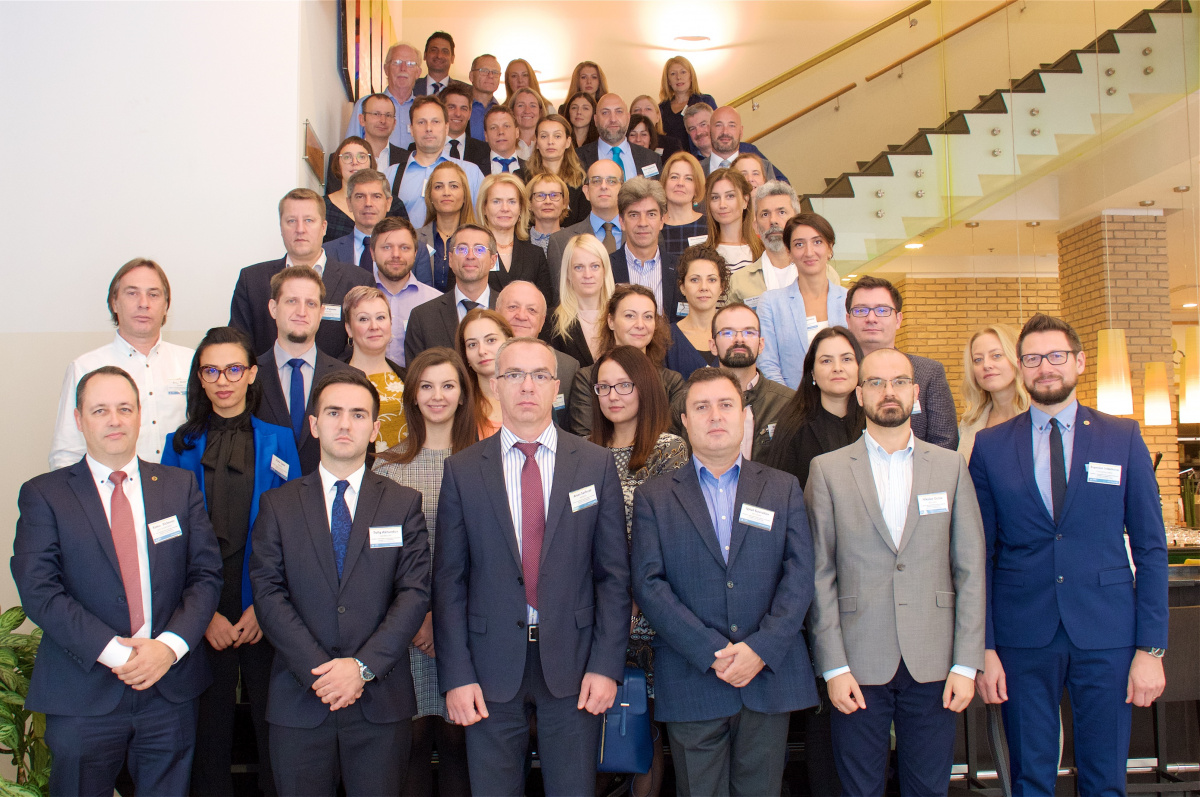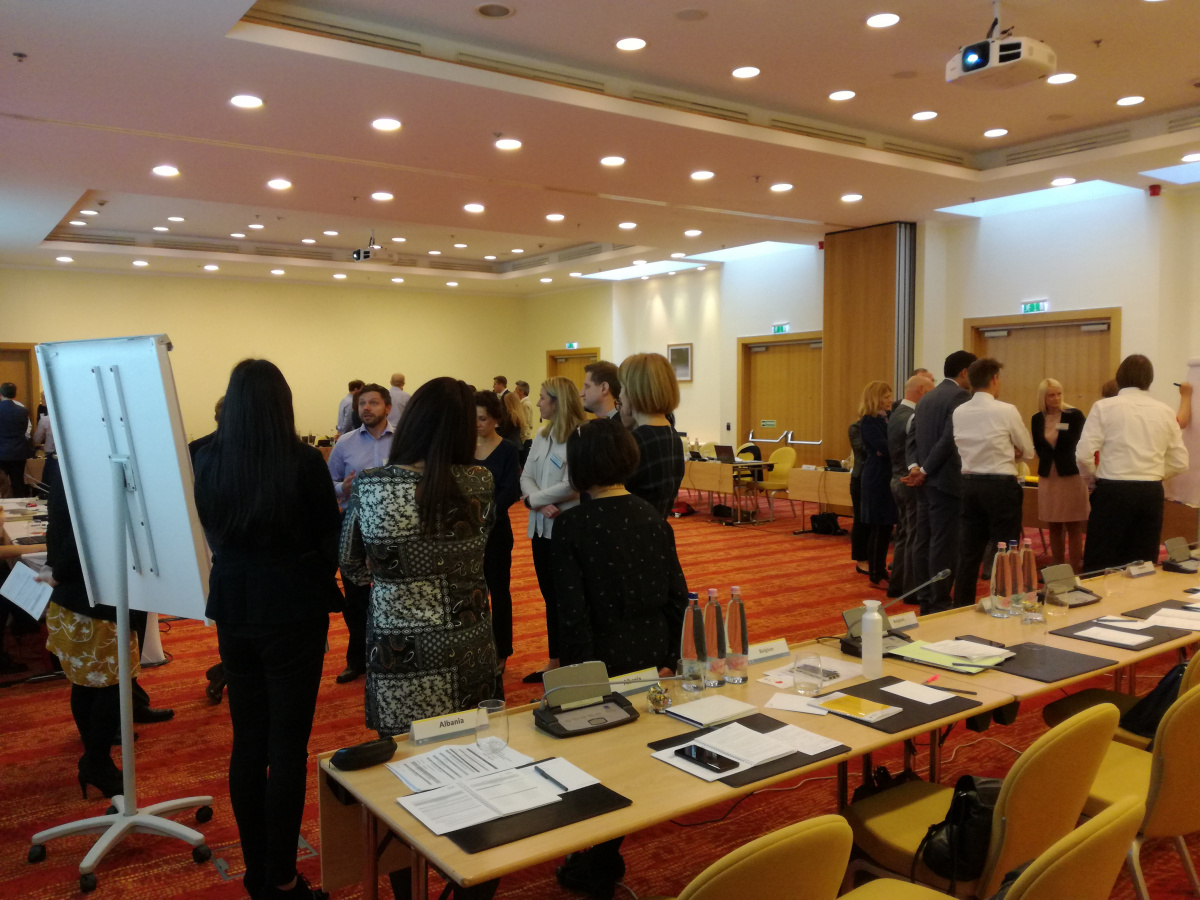An IOTA Workshop on „Implementing proactive business transformation strategies in tax administrations” was organised by the IOTA Secretariat in Budapest, Hungary on 8-10 October 2019. Over fifty delegates from twenty-seven IOTA member countries gathered to discuss most effective approaches to proactive business transformation in tax administrations. IMF, one of IOTA’s international partner organisations, was also represented at the workshop.
 The workshop brought together senior officials responsible for change management, business transformation and innovation in IOTA member tax administrations from both EU and non-EU countries. Throughout the 3 days of the workshop participants discussed best practices in planning, executing and monitoring transformations in IOTA tax administrations.
The workshop brought together senior officials responsible for change management, business transformation and innovation in IOTA member tax administrations from both EU and non-EU countries. Throughout the 3 days of the workshop participants discussed best practices in planning, executing and monitoring transformations in IOTA tax administrations.
The event facilitated presentations, plenary discussions, panel talks and sessions of group discussions. It was also a great occasion for IOTA member experts to meet and share new ideas, discuss developments in business transformation as well as create an informal IOTA network of experts working in this area.
In her opening speech Mónika Váradi, Head of International Relations Department at the National Tax and Customs Administration, Hungary highlighted that „Providing possibilities for the membership to share best practices is a real asset and the main strength of IOTA. Currently, many IOTA tax administrations are going through some sort of business transformation, which have fundamentally reshaped organisational structures, business processes and have direct budget, technology and HR impacts.This workshop is a platform for us to learn about approaches and methods different from our own. I am sure that in these 3 days we will all come across good methods and best practices to take back.”
On the first day the plenary presentations of the workshop pinpointed the importance of applying step-by-step approach in defining- strategic ambitions and changes and how those could be translated into the concrete trnsformational programmes and projects at the Federal Public Service Finances of Belgium). Making tax digital by UK HMRC was another example of digital transformation considering value, ease and trust as core concepts. This presentation by IMF on Medium-Term Revenue Strategy - MRTS covered four steps need to be undertaken in a systematic manner for MRTS formulation.
 On the second day of the workshop participants could continue discovering and learning about digital transformation of taxation in Norway; structural realignment and modernisation of the PAYE Tax System in the Irish Revenue; easing tax for business, tax morale, better e-services and working process revamping as main directions of implementing proactive business transformation strategies in French tax administration (DGFiP); the main strategic goals and projects carried out by the National Tax and Customs Administration of Hungaryto reach the strategic aims, the challenges and new paths of reorganization in the Italian Revenue Agency, and customers’ needs driven changes to processes and even to organization's structure of the Finnish tax administration.
On the second day of the workshop participants could continue discovering and learning about digital transformation of taxation in Norway; structural realignment and modernisation of the PAYE Tax System in the Irish Revenue; easing tax for business, tax morale, better e-services and working process revamping as main directions of implementing proactive business transformation strategies in French tax administration (DGFiP); the main strategic goals and projects carried out by the National Tax and Customs Administration of Hungaryto reach the strategic aims, the challenges and new paths of reorganization in the Italian Revenue Agency, and customers’ needs driven changes to processes and even to organization's structure of the Finnish tax administration.
Asko Pajunen, Program Director at the Finnish Tax Adminsitration talked about customers’ needs and possible solutions. "Our new perspective that we started to work with was to identify the needs of customer groups and create customer solutions tailored to the needs of customer groups. We are changing tax administration processes and our organization to support customer driven development and other tax administration operational objectives to better serve the needs of customers."
On the third day of the event Georgia opened the plenary session with a presentation about implemented and ongoing reforms in the Revenue Service. Then Greece continued and closed the lines of presentation by speaking about the main areas of the Reform Action Plan of the Greek Independent Authority for Public Revenue.

During the three days there was a number of group sessions which created excellent opportunities for participants to share their views and have in-depth discussions about the drivers of business transformations along with the ways of planning, resourcing and executing such reforms in tax administrations.
At the end of the last day, the panel debate took place with participation of delegates from Albania, Armenia, Ireland and Finland. Panellists shared their lessons learned from this event. At the panel debate, Principal Officer Ruth Kennedy from the Irish Revenue Commissioners said „the workshop offered me the opportunity to understand the direction and approach various tax administrations are taking to proactive business transformation. The key takeaways for me were that business transformation is an evolving journey rather than a programme with a start and an end. Transformation is challenging and requires strong leadership, a shared vision and organisational agility coupled with the technical knowledge and skills to imagine, and re-imagine, the art of the possible.”
In summary, the IOTA workshop „Implementing proactive business transformation strategies” was a great success offering the possibility for participating delegates to:
- gain understanding of successful business transformation strategies in tax administrations;
- learn about business transformation developments that other tax administrations and
- gain better understanding of challenges and nuances of implementing business transformation strategies and how tax administrations were able to tackle them.
More information on the „Implementing proactive business transformation strategies in tax administrations” workshop, including all presentations, is available here for registered users of IOTA website.
